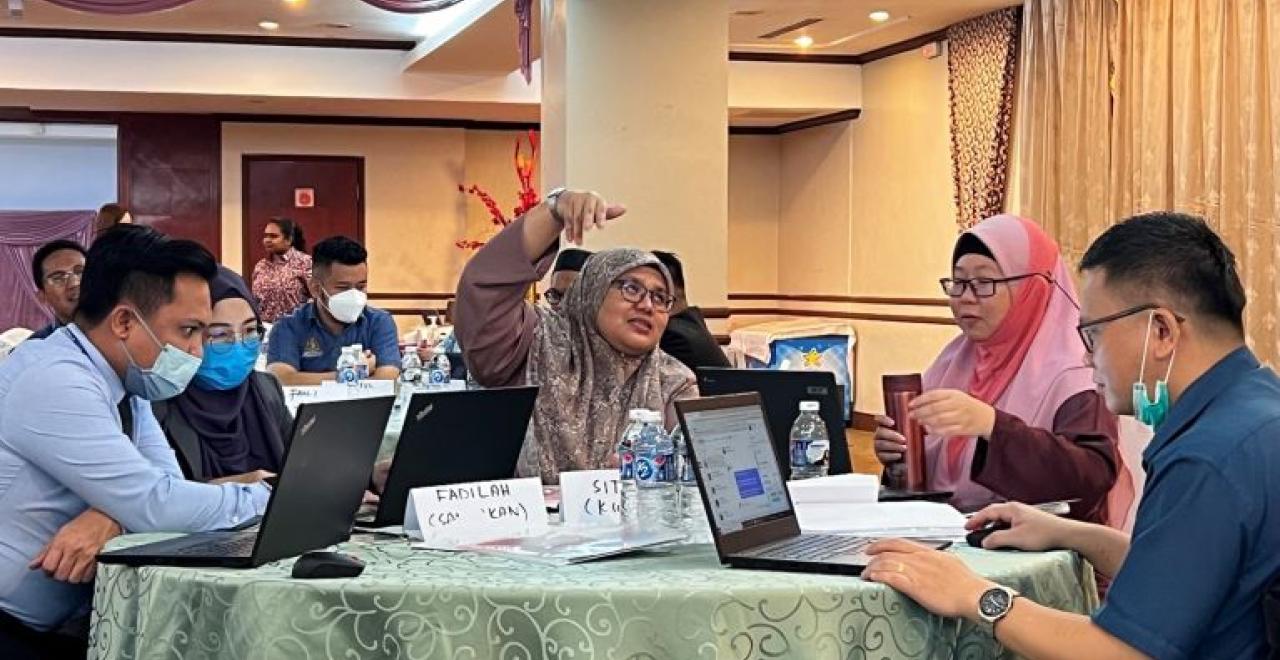Malaysian labour inspectors increase capacity to advance workers’ rights in palm oil sector in Indonesia and Malaysia

SABAH, Malaysia - Sabah labour inspectors have been trained on forced labour, child labour and gender-based violence and harassment in the workplace, focusing on the palm oil sector in Malaysia and Indonesia.
Given the size and relevance of the palm oil sector in the whole Sabah economy and the labour force that includes migrant workers, 34 officers of the Sabah Department of Labour (DOL) were equipped with information and techniques utilizing the ILO “Facilitator’s Manual: Training for Malaysian inspectors on forced labour, child labour and gender-based discrimination, violence and harassment (GBVH) in the workplace ” to address the sector’s workers’ needs and advance their labour rights.
The four-day training was conducted by the ILO in collaboration with the Ministry of Human Resources and Sabah DOL trainers, on 3-6 October, in Sandakan, Sabah. It included lectures and interactive activities about concepts, legal framework and practical tips on identifying forced labour, child labour and GBVH, victim protection and access to legal remedy. It also included strategic compliance planning and the role of labour inspectors in the community-based complaints mechanisms in selected districts in Sabah, as well as a one-day field visit to plantation estate and a smallholder, which helped enable the participants to apply the knowledge and tools introduced during the training.
“One of the programme areas under the National Action Plan on Forced Labour (NAPFL) is to focus on building capacity for law enforcement such as the labour inspectorate.” - Emyzai binti Zainudin, Principal Assistant Secretary of the Ministry of Human Resources
In 2021, Malaysia launched its NAPFL 2021-25 and the National Action Plan on Trafficking in Persons (NAPTIP) 2021-25 and. Improving enforcement and labour migration governance are key targets in the NAPFL and NAPTIP. Specifically in Sabah, the palm oil industry is one of its key priorities in addressing migrant workers’ issues, including forced labour and child labour.
Panudda Boonpala, Deputy Regional Director for ILO Asia and the Pacific highlighted the link between national efforts and labour inspection. “We at the ILO believe that one of the key factors to ensure the success of the NAPFL would be the role of labour inspectors in all sectors of employment, including in the palm oil sector. Labour inspectors play a critical role in ensuring that the rights of all workers are protected and respected in the world of work. This training is part of the ILO’s long-term commitment to assist its constituents in building and strengthening their knowledge and skills all labour related matters,” she said.
Virpi Kukkasniemi-Leino, Political Officer of the Delegation of the European Union to Malaysia reiterated their support to the ILO and the Malaysian government in promoting decent work in the country, and in particular in increasing capacity to enforce the labour legislation.
According to the Pesticides Action Network Asia Pacific (PANAP)'s 2019 report, it is estimated that out of 577,900 plantation workers, 60 per cent are migrant workers with 2 per cent of being women. 70 per cent of these migrant workers are from Indonesia. However, the figure excludes undocumented and contract workers. PANAP also stated that around 9,000 women plantation workers are registered with the National Union of Plantation Workers, but this is an underestimation as many are working as contract workers.
Generally, women have been largely hired as temporary workers and casual day labourers in the palm oil plantations in Malaysia and Indonesia. Lacking permanent employment status, many women workers are excluded from social benefits and protections such as pensions and maternity leave, and they are vulnerable to sudden termination.
“Labour inspectors play an important role in ensuring that labour laws are applied equally to all employers and workers, including in addressing the specific needs or vulnerabilities of migrant workers, particularly of women migrant workers,” - Panudda Boonpala, Deputy Regional Director for ILO Asia and the Pacific
The training resulted in a pool of skilled and knowledgeable labour inspectors in Sabah who are committed to eradicating labour rights violation and all forms of violence against women migrant workers. More frequent inspections will be undertaken by these inspectors to ensure that the employers are compliant with all laws and policies pertaining to labour.
This Sabah training is supported by the ILO projects “Safe and Fair: Realizing women migrant workers’ rights and opportunities in the ASEAN region” under the European Union-United Nations Spotlight Initiative and “Advancing Workers’ Rights in the Palm Oil Sector in Indonesia and Malaysia” with funding from the US Department of State Bureau of Democracy, Human Rights and Labor.
For more information please contact:
Pichit Phromkade
Communications Officer, Safe and Fair Programme
ILO Regional Office for Asia and the Pacific
E: phromkade@ilo.org
M. +66 89 616 0442
